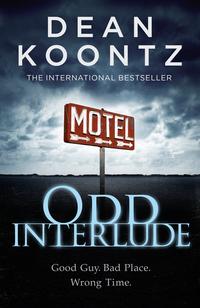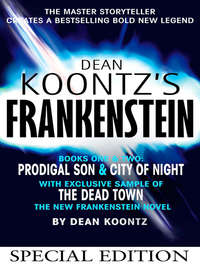
Полная версия
Ashley Bell
Nancy settled in one of the two chairs for visitors, holding her and Bibi’s purses, hands clutching them as if she anticipated a robbery attempt, though it wasn’t a purse snatcher that she feared.
Manuel lowered the power bed and assisted Bibi to sit on the edge. “Unless you feel dizzy, don’t lie down yet,” he instructed.
He rolled the wheelchair into the hallway, where he met a tall athletic-looking man in scrubs, evidently a physician. The doctor wheeled before him a portable computer station designed to be used while the operator remained standing, into which he entered details regarding the preliminary diagnosis and treatment of each patient he attended.
“Are you all right, baby?” Nancy asked.
“Yes, Mom. I’m okay. I’m going to be fine.”
“Do you need anything? Water? Do you need water?”
Bibi’s mouth kept flooding with saliva, as if she were about to throw up, but she swallowed it and kept her breakfast down. The last thing she wanted was water.
In the hallway, after Manuel spoke with the tall man for a moment, the latter came into the cubicle and introduced himself as Dr. Armand Barsamian. His calm demeanor and confident manner would have reassured Bibi under other circumstances.
While he checked her eyes with an ophthalmoscope, he asked a few questions—her name, date of birth, Social Security number—and she realized that he wanted to ascertain whether or not her memory had been affected by whatever was happening to her.
“We need to get a CT scan of the brain,” Dr. Barsamian said. “If this is a stroke, the quicker we identify the cause—thrombosis, hemorrhage—and determine treatment, the more likely you’ll fully recover.”
Already an orderly with a gurney had appeared in the doorway. The physician helped Bibi lie upon it.
As she was wheeled away, her mother stood in the hall, looking bereft, as though she half expected never to see her daughter again. The orderly turned a corner, and Bibi lost sight of her mom.
On the second floor, the room containing the CT scanner felt chilly. She didn’t ask for a blanket. Superstitiously, she felt that the more stoic she remained, the better the outcome of the test.
She transferred from the gurney to the scanner table.
The orderly stepped out of the room as a nurse appeared with a tray on which were arranged a rubber-tube tourniquet, a foil packet containing a disposable cloth saturated with antibacterial solution, and a hypodermic needle containing a contrast medium that would make blood vessels and abnormalities of the brain show up more clearly.
“Are you okay, dear?”
“Thank you, yes. I’m okay.”
After the nurse departed, the unseen CT technician spoke to Bibi through an intercom from an adjacent chamber, explaining how the procedure would progress. The woman had a gentle girlish voice with the faint trace of a Japanese accent, so that when Bibi closed her eyes, a scene more vivid than the CT room formed around her.…
A flagstone path leads to a red moon gate entwined with dazzling white chrysanthemums. Beyond lies a teahouse sheltered by cherry trees in blossom, a scattering of their pale petals gracing the dark stone underfoot. Inside, geishas in silk kimonos wear their long black hair twisted up in elaborate arrangements held in place by ivory pins carved in the shape of dragonflies.
A sliding cradle in the table moved Bibi backward, headfirst, into the aperture of the scanner, rousing her from that teahouse of the mind. The procedure was completed so quickly that she wondered if it had been done correctly, though she knew that the hospital staff’s competence was the least of her concerns.
She was frightened by the speed with which they had handled her case since she had entered the ER waiting room. She would have no hope of peace until they arrived at a diagnosis. Nevertheless, the faster they worked, the more she felt as though she were sliding down a chute, accelerating, into an abyss.
7
Twelve Years Earlier
The Power of Cookies
OLAF, THE STRAY GOLDEN RETRIEVER THAT wandered out of the rainstorm, had been with the Blair family for less than a week when he settled into the habit of climbing the stairs to the apartment above the garage. He enjoyed lounging on the small balcony that contained a pair of rocking chairs. He rested his chin on the bottom rail of the white-painted balustrade, peering between the balusters and into the courtyard behind the bungalow, as if he were a prince contentedly surveying his domain.
Each time she discovered him up there, young Bibi called him down, at first in a whisper that she was certain he could hear, because dogs had better hearing than did human beings. Although he watched her as she stood below, Olaf always pretended to be deaf to her entreaties. When she raised her voice to a stage whisper, he still failed to come to her, though the soft thumping of his tail against the balcony floor proved that he understood her commands.
She dared not climb the stairs to take the dog by the collar and escort him down. Once on the balcony, she would be only a few feet from the front door of the apartment. Too close.
Frustrated, Bibi paced the courtyard, glancing up repeatedly at Olaf but never at any of the three windows. The sun made mirrors of those panes of glass, so that she couldn’t see anyone even if he might be standing inside, watching. Nevertheless, she did not rest her gaze directly on any window.
She went into the bungalow and, from a tin in the pantry, took two of the carob cookies that the retriever couldn’t resist. In the courtyard once more, she held a treat in each hand, arms raised above her head, letting Olaf smell his delicious reward for obedience. She knew that he caught the carob scent, for even from the courtyard she could see his wet black nose twitching between the balusters.
The cookies had always worked before, but not this time. After a few minutes, Bibi retreated to the back porch of the bungalow and sat on a wicker sofa with thick cushions upholstered in a palm-leaf pattern.
Olaf liked to lie there beside her, his head in her lap, while she stroked his face, scratched his chest, and rubbed his tummy. The porch roof blocked her view of the apartment windows, but she could just still see the lower part of the balcony railing and the dog with his snout between two balusters. He was watching her, all right.
Bibi brought one of the carob treats to her nose, smelled it, and decided that it would not be offensive to the human tongue. She bit the cookie in half and chewed. It didn’t taste bad, but it didn’t taste fabulous, either. Carob was supposed to have a flavor much like that of chocolate, which dogs couldn’t eat, but it would never put Hershey out of business.
From his perch on the apartment balcony, Olaf had seen half of his treat brazenly consumed. His chin no longer rested on the bottom rail of the balustrade. His snout poked between two balusters a foot below the top rail, which meant that he’d gotten to his feet.
Bibi waved the remaining half of the cookie back and forth in front of her nose, back and forth, raising her voice to express her unqualified approval of that delicacy. “Mmmmm, mmmmm, mmmmm.”
Olaf bolted down the stairs from the balcony, across the brick courtyard, and onto the porch. He bounded onto the sofa, landing with such force that the wicker crackled and creaked in protest.
“Good boy,” said Bibi.
With his soft mouth, he took the half cookie from between her thumb and forefinger. She fed him the second cookie whole, and while he chewed it with noisy pleasure, she said, “Don’t go up there again. Stay away from the apartment. It’s a bad place. It’s terrible. It’s evil.”
After he finished licking his chops, the dog regarded her with what she took to be solemn consideration, his pupils wide there in the shadows of the porch, his golden irises seeming to glow with an inner light.
8
Hammered and Fully Prosecuted
NANCY TOLD HERSELF TO CHILL OUT, GEL, TO sideslip through the moment, ride out the chop, to just sit in one of the visitor chairs and wait for Bibi to be brought back from the CT scan. But even when she had been an adolescent surf mongrel learning the water, she had never been a Barbie with the placidity of a doll. When on a board, she had always wanted to shred the waves, tear them up, and when the waves were mushing and the land had more appeal than the ocean, she had always nonetheless pumped through the day with her usual energy.
And so when Murph turned the corner from the first ER hallway into the second, Nancy was pacing back and forth outside the cubicle from which Bibi had been wheeled away on a gurney. She didn’t see him immediately, but intuited his arrival by the way a couple of nurses did double takes and smiled invitingly and whispered to each other. Even at fifty, Murphy looked like Don Johnson in the actor’s Miami Vice days, and if he had wanted other women, they would have been hanging off him like remora, those fish that, with powerful suckers, attached themselves to sharks.
Murph still wore a black T-shirt, a Pendleton with the sleeves rolled up, and boardshorts, but in respect for the hospital, he had stepped out of sandals and into a pair of black Surf Siders with blue laces, worn without socks. Newport Beach was one of the few places in the country where a guy dressed like Murph would not seem out of place in a hospital or, for that matter, in a church.
He put his arms around Nancy, and she returned his hug, and for a moment neither of them spoke. Didn’t need to speak. Needed only to cling to each other.
When they pulled back from the embrace and were just holding hands, Murph said, “Where is she?”
“They took her for a CAT scan. I thought they would have brought her back by now. I don’t know why they haven’t. It shouldn’t take so long—should it?”
“Are you okay?”
“I feel like I’ve been hammered, fully prosecuted,” she said, both terms surfer lingo for wiping out and getting brutally thrashed by a killer wave.
“How’s Bibi doing?” he asked.
“You know her. She copes. Whatever’s happening to her, she’s already thinking what she’ll do once she’s gotten through it, if maybe it’s good material for a story.”
Rolling his mobile computer station before him, Dr. Barsamian, the chief ER physician during the current shift, approached them with the news that Bibi had been admitted to the hospital following her CT scan. “She’s in Room 456.”
The doctor’s eyes were as black as kalamata olives. If in fact he knew something horrific about Bibi’s condition, Nancy could read nothing in his gaze.
“The CT scan seems to have been inconclusive,” Barsamian said. “They’ll want to do more testing.”
In the elevator, on the way from the first floor to the fourth, Nancy suffered a disturbing moment of sensory confusion. Although the position-indicator light on the directory above the doors went from 1 to 2, then to 3, she could have sworn that the cab was not ascending, that it was descending into whatever might occupy the building’s two subterranean levels, that they were being cabled and counterweighted down into some enduring darkness from which there would be no return.
When the light moved to the 4 on the directory and the doors of the cab slid open, her anxiety did not abate. Room 456 was to the right. When she and Murph got there, the door stood open. The room contained two unoccupied beds, the sheets fresh and taut and tucked.
Bibi’s drawstring bag stood on the nightstand beside the bed that was nearer to the window. When Nancy peered into it, she saw a toothbrush, toothpaste, and other items, but no pajamas.
Each bed came with a narrow closet. One of them proved empty. In the other hung Bibi’s jeans and long-sleeved T-shirt. Her shoes stood side by side on the closet floor, her socks stuffed in them.
With the squeak of rubber-soled shoes and the scent of soap, a young blond woman in blue scrubs entered the room. The nurse looked too young to be credentialed, as if she might be just fifteen and playing hospital.
“They told us our daughter would be here,” Murph said.
“You must be Mr. and Mrs. Blair. They’ve taken Bibi for tests.”
“What tests?” Nancy asked.
“An MRI, blood work, the usual.”
“None of this is usual to us,” Nancy said, trying for a light tone of voice and failing.
“She’ll be all right. It’s nothing intrusive. She’s doing fine.”
The much-too-young nurse’s reassurances sounded as hollow as a politician’s promises.
“She’ll be a while. You might want to go down to the cafeteria for lunch. You’ll have the time.”
After the nurse left, Nancy and Murph stood for a moment in bewilderment, looking around the room as though they had just now been teleported into it by an act of sorcery.
“Cafeteria?” he asked.
Nancy shook her head. “I’m not hungry.”
“I was thinking coffee.”
“Hospitals ought to have bars.”
“You never drink before five-thirty.”
“I feel like starting.”
She turned toward the window and then, with a sudden thought, turned away from it. “We need to tell Paxton.”
Murph shook his head. “We can’t. Not now. Don’t you remember? His team is on a blackout mission. No way to reach them.”
“There’s got to be a way!” Nancy protested.
“If we tried and Bibi found out, she’d want our scalps. Even though they’re not married yet, she’s getting more like him each day, tough-minded and committed to the way things are in that life.”
Nancy knew he was right. “Who would have thought it would be her we’d have to worry about instead of him?”
She switched on the TV. None of the programs was entertaining. All of them seemed intolerably frivolous. The news inspired despair.
They went down to the cafeteria for coffee.
9
Into the Tunnel of Fate
LATER, BIBI WOULD BE TOLD THAT THE CT SCAN had been inconclusive but suggestive, that her doctors would have preferred a stroke to what was now suspected. Having eliminated the possibility of embolism or hemorrhage, they proceeded with a growing concern that they refrained from sharing with her. Their smiles were masks, not because they wished to deceive her, but because physicians, no less than their patients, live to hope.
Later, too, she would learn that if embolism and hemorrhage were ruled out, her best chance of a full recovery might be a diagnosis of brain abscess, which was a pus-filled cavity surrounded by inflamed tissue. This life-threatening condition could be treated with antibiotics and corticosteroids. Often surgery proved unnecessary.
They drew blood for a culture. They took chest X rays. They hooked her up for an EEG that lasted almost an hour, to study the electrical activity of her brain.
By the time she was gurneyed to another room for an MRI, Bibi felt as though she had run a marathon up countless flights of stairs. She wasn’t merely tired but fatigued. Such weariness couldn’t be the result of what little physical activity the day had entailed. She assumed that her growing exhaustion was yet another symptom of her illness, like the head-to-foot tingling along her left side, the rancid taste that came and went, and the weakness in her left hand.
She had no appetite for lunch, and they had offered her only water. Perhaps fasting was required for some of the tests. Or maybe they were anxious to gather all the information required for an urgently needed diagnosis.
Because the MRI machine was an enclosed tunnel only slightly greater in diameter than a human body, a nurse asked, “Are you claustrophobic?”
“No,” Bibi said, refusing a mild sedative as she lay on the table that would carry her into the ominous cylinder.
She refused to admit even the possibility of such a weakness. She wasn’t a wimp, never had been, never would be. She admired toughness, fortitude, determination.
Instead, she accepted earbuds that allowed her to listen to music and a handheld device with which she could signal the equipment operator if she became distressed.
Her time in the machine would be lengthy. Modern MRI technology allowed scans with highly specific purposes. A functional MRI would provide measurements of nerve-cell activity in the brain. Magnetic-resonance angiography could assess heart function and blood-vessel flow throughout the body. Magnetic-resonance spectrography would provide detailed analysis of chemical changes in the brain caused by a variety of afflictions.
The music proved to be wordless, mellow orchestral versions of songs she couldn’t quite identify. From time to time, the machine made thumping noises audible through the music, as if the technician needed to spur the MRI along with hammer blows. Bibi felt her heart laboring. The signaling device grew slippery in her sweaty hand.
She closed her eyes and tried to distract herself with thoughts of Paxton Thorpe. A beautiful man in every way: his body and face, his eyes, his heart and mind. She’d met him more than two years earlier. Five months ago, she had accepted his proposal. Just as her name had meaning, so did his: Paxton meant town of peace, which was ironic, considering that he was a kick-ass Navy SEAL. Pax was currently on a full-silence mission with his team, going somewhere to do something to bad people who no doubt deserved even worse than they were going to get. The team would be operating in blackout mode for maybe a week or ten days. No phone calls. No tweets. No way for him to be told what was happening to his fiancée.
She missed him desperately. He said that she was the touchstone by which he would, at the end of his life, measure whether he had been a good man or not, fool’s gold or the real thing. She already knew the answer: the real thing. He was her rock, and she wanted him now, but she was already steeped in the stoic code of the military and refused to be reduced to tears by his absence. In fact, sometimes she thought she must have been a military wife in a previous life, for the mindset of one came so naturally to her.
As the humming machine knocked and thumped, saliva suddenly filled Bibi’s mouth. As before, this suggestion of impending regurgitation wasn’t accompanied by nausea, and the threat passed.
In her mind’s ear, she heard her mother say, It’ll be what it’ll be. Those five words were Nancy and Murphy’s mantra, their concession to the ways of nature and fate. Bibi loved them as much as any child loved her parents, but their understanding of the world’s true nature did not match hers. She would concede nothing to fate. Nothing.
10
The Kind of Girl She Is
BY FOUR O’CLOCK THAT AFTERNOON, DR. SANJAY Chandra had become the principal physician in charge of Bibi’s case.
Nancy liked him on sight, but for the strangest reason. In her childhood, she’d been enchanted by a book about a gingerbread cookie that came to life. In the illustrations, the cookie, whose name was Cookie, had not been as dark as gingerbread, but instead a warm shade of cinnamon, with a lovely smooth round face and chocolate-drop eyes. If the book hadn’t been at least forty years old, about the same age as the physician, she might have thought that the artist had known him and that he’d been the inspiration for the look of the storybook character. Dr. Chandra possessed a sweet, musical voice, as you might expect that a cookie-come-to-life should have, and his manner was likewise pleasing.
After the array of tests she endured, Bibi had been returned to her hospital room in a state of exhaustion. In spite of her concern about her condition, she wanted only to sleep before dinner. She had passed out as if she’d mainlined a sedative.
Dr. Chandra didn’t want to disturb her, and indeed he preferred to wait until the following day to sit with her and discuss what the tests had revealed, after he had more time to review the results. But although Bibi was twenty-two, no longer a ward of her parents, the doctor wished to speak with them first, and at once, “to determine,” as he put it, “the kind of girl she is.”
Nancy and Murph sat with him at a table in the break room, at the north end of the fourth floor, where at the moment none of the staff was taking a break. The vending machines hummed softly, as though mulling over some grave decision, and the unforgiving glare of the fluorescent lights did not inspire serenity.
“I’ve told Bibi only that time is needed to review all the test results, to reach a diagnosis and design a course of treatment,” Dr. Chandra said. “I’ll meet with her at ten tomorrow morning. It is always a concern to me that my diagnosis and prognosis are presented to my patient in as comforting a manner as possible. I have found that it helps to have a sense, in advance, of the person’s psychology and personality.”
Nancy didn’t like the sound of this. Good news didn’t require the careful tailoring of the words with which it would be delivered. She might have said as much, except that suddenly she didn’t trust herself to speak.
“Bibi is an exceptional girl,” Murph said. Perhaps no one else but Nancy could have detected the strain in his voice. He looked only at the doctor, as if to meet his wife’s eyes would undo him. “She’s smart, a lot smarter than me. She’ll know if you’re putting even the slightest shine on the truth. That’ll upset her. She’ll want to hear it blunt and plain, not prettied up. She’s tougher than she looks.”
Murph began to tell the physician about the death of Olaf, the golden retriever, who had passed away almost six years earlier, a few months after Bibi’s sixteenth birthday. At first Nancy was surprised that her husband would think this story had any relevance to the moment. As she listened, however, she realized that it perfectly answered Dr. Chandra’s question about the kind of girl Bibi was.
The physician did not interrupt, only nodded a few times, as though he had no other patient but Bibi for whom to prepare.
When Murph finished telling of Olaf’s death, Nancy dared to ask a question, throughout which her voice trembled. “Dr. Chandra … what kind of doctor are you? I mean … what’s your specialty?”
He met her eyes directly, as though he assumed that she shared her daughter’s indomitable and stoic nature. “I’m an oncologist, Mrs. Blair. With an additional specialty in surgical oncology.”
“Cancer,” Nancy said, the word issuing from her with such a note of dread that it might have been a synonym for death.
His dark-chocolate eyes were warm and sympathetic, and in them she saw what seemed to be sorrow. “Though I really do need to review the test results more closely, I feel certain we are dealing here with gliomatosis cerebri. It originates in the connective cells of the brain and infiltrates quickly, deeply into surrounding tissue.”
“What causes it?” Murph asked.
“We don’t know. Scientists have had little chance to study the disease. It’s exceedingly rare. We see no more than a hundred cases a year in the entire United States.”
Nancy realized that she had come forward in her chair and that she was holding the edge of the table with both hands, as though to anchor herself against some great approaching turbulence.
“You’ll remove the tumor,” Murph said, making of those words a hopeful statement rather than a question.
After a hesitation, the oncologist said, “This tumor isn’t localized like those in other forms of cancer. It has a spiderweblike pattern, filmy threads across more than one frontal lobe. It can be difficult to detect. The boundaries of the malignancy are hard to define. In certain cases, primarily in young children, surgery may be an option, but seldom a good one.”
Perhaps consoled and given hope by the fact that the glioma was not easily detected, Murph said, “Then you treat it how—with chemo, radiation?”







